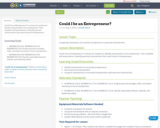
What is Business Model Innovation? This video describes the process in which an organization adjusts its business model.
- Subject:
- Business and Communication
- Material Type:
- Lesson
- Author:
- Los Angeles Pacific University
- Date Added:
- 06/30/2021

What is Business Model Innovation? This video describes the process in which an organization adjusts its business model.

Could I be an Entrepreneur? Is a lesson for students to identify characterisitcs of an entrepreneur. Then complete self assessments to identify personal characteristics that match those of entrepreneurs.

Are you ready to BUILD? Get ready to launch an engaging community-building Challenge."More than 90% of the students and teachers who have completed our challenge said they would recommend it to others."Watch your students embrace entrepreneurial thinking as they create real-world solutions to today’s challenges. BUILD's Thriving Communities Design Challenge invites youth to use Design Thinking to answer: How might we build powerful, thriving communities where everyone enjoys safety, wellness, and economic freedom.

Entrepreneurship is the cornerstone of any modern economy - everyday, entrepreneurs around the world are starting their own business. This free online course from The E-Learning Network (TELNET) examines how entrepreneurs can surmount obstacles and also examines how business ideas can be developed and habits an entrepreneur must adopt to be a success. Upon completion of this course you will develop an understanding of obstacles entrepreneurs face and how to overcome them. You will gain a good knowledge of the development process and the planning process involved in the launch of a new product. You will have a good understanding of the business ecosystem and a knowledge of successful entrepreneurial habits. This course is ideal for anyone who wants to learn more about entrepreneurship or who may be thinking about starting their own business.

15.389A Global Entrepreneurship Lab: Asia-Pacific enables teams of students to work with the top management of global start-ups and gain experience in running, and consulting to, a new enterprise outside the United States. The focus is on start-ups operating in emerging markets throughout the world, with a special focus on the Asia-Pacific region. The course combines an internship in a growing firm with in-class discussions of the issues and policies that affect the climate for innovation and start-up success around the world.
Special Features
15.389A is part of a two-section course and includes materials that cover entrepreneurship in the Asia-Pacific region. 15.389B Global Entrepreneurship Lab: Latin America, the Middle East, and Africa is also available on OpenCourseWare and covers topics pertinent to these additional regions.

15.389B Global Entrepreneurship Lab: Latin America, the Middle East, and Africa enables teams of students to work with the top management of global start-ups and gain experience in running, and consulting to, a new enterprise outside the United States. The focus is on start-ups operating in emerging markets throughout the world, with a special focus on Latin America, the Middle East, and Africa. The course combines an internship in a growing firm with in-class discussions of the issues and policies that affect the climate for innovation and start-up success around the world.
Special Features
15.389B is part of a two-section course and includes materials that cover entrepreneurship in Latin America, the Middle East, and Africa. 15.389A Global Entrepreneurship Lab: Asia-Pacific is also available on OpenCourseWare and covers topics pertinent to these additional regions.

Introduction to Business is a survey business course providing a multidisciplinary examination of how culture, society, human behavior and economic systems interact with legal, international, political, and financial institutions to affect business policy and practices within the U.S. and the global marketplace.

Over the last 40 years, new managerial technologies in Western democratic societies have emerged to dominate our perceived and lived reality. Demands for autonomy and a creative life, which have been the touchstones for artistic endeavors, have been readily absorbed into management philosophies, becoming normative values for self-management and entrepreneurial innovation. Is this art’s triumph or demise? Can we imagine other worlds beyond our managed reality and propose forms of living not yet captured by the rationality of network capitalism? We will explore the “creative” figure and how it can shape renewed critical expressions in fields such as technology, design, science, philosophy, etc.